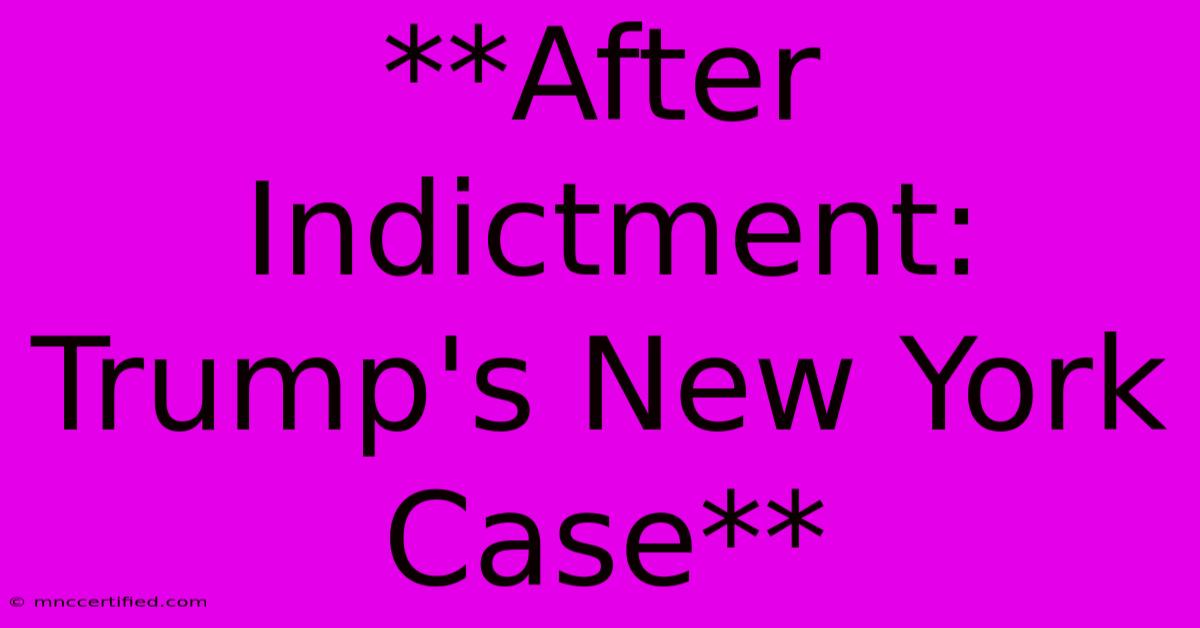**After Indictment: Trump's New York Case**

Table of Contents
After Indictment: Trump's New York Case Explained
On April 4, 2023, former President Donald Trump became the first former U.S. president to be indicted on criminal charges. The indictment, handed down by a Manhattan grand jury, stems from an investigation into alleged hush money payments made to adult film actress Stormy Daniels during the 2016 presidential campaign. This case, and the ensuing legal proceedings, will likely have significant implications for both Trump's political future and American jurisprudence.
The Charges Against Trump
The indictment accuses Trump of 34 felony counts of falsifying business records in the first degree. The charges center around a series of payments made to Daniels and other individuals in the lead-up to the 2016 election. Prosecutors allege that these payments were designed to suppress negative information about Trump's candidacy and were falsely recorded in business records as legal expenses.
The Case's Context
This case arises from a broader investigation into Trump's business dealings, including his organization's handling of finances and his potential involvement in alleged tax fraud. The Manhattan District Attorney's office, led by Alvin Bragg, has been pursuing this investigation for several years.
The case is also deeply intertwined with the political landscape. Trump has repeatedly denied any wrongdoing, labeling the charges as politically motivated and part of a "witch hunt" orchestrated by his political adversaries. This claim is fueled by the fact that the investigation began shortly after Trump left office.
The Legal Process Ahead
Trump's legal team will likely argue that the payments to Daniels were legitimate and unrelated to the election. They may also challenge the indictment on technical grounds, arguing that the charges are based on weak evidence or that the Manhattan District Attorney's office lacks jurisdiction.
The trial, if it goes ahead, will be a highly scrutinized legal event. The prosecution will need to present evidence proving beyond a reasonable doubt that Trump intentionally falsified business records with the intent to cover up illicit payments. The defense will aim to cast doubt on the prosecution's case and highlight any perceived political motivations behind the charges.
Implications for the Future
The outcome of this case will have significant consequences for both Trump and the political landscape. If convicted, Trump could face significant legal penalties, including fines and potential imprisonment. This could also damage his political prospects, potentially hindering his ability to run for office in the future.
Beyond Trump, this case has implications for the legal system and the balance of power in American politics. It raises questions about the extent to which prosecutors can pursue investigations into powerful figures and the potential for political motivations to influence criminal justice decisions.
Public Opinion and Media Coverage
The public's reaction to the indictment has been sharply divided along political lines. Trump's supporters view the case as a politically motivated attack, while his detractors see it as a necessary step towards holding him accountable for his actions. The media coverage has been similarly polarized, with some outlets framing the case as a major scandal while others emphasize Trump's claims of innocence and political persecution.
Conclusion
Trump's New York indictment marks a significant moment in American history. It is a landmark legal case that could have far-reaching consequences for both Trump's political future and the nation's political landscape. As the legal process unfolds, the public will be closely watching to see how this unprecedented situation plays out and what impact it has on American politics and jurisprudence.

Thank you for visiting our website wich cover about **After Indictment: Trump's New York Case**. We hope the information provided has been useful to you. Feel free to contact us if you have any questions or need further assistance. See you next time and dont miss to bookmark.
Featured Posts
-
What Insurance Does Afc Urgent Care Accept
Nov 07, 2024
-
Lewotobi Laki Laki Volcano Eight Eruptions Ash Cloud Over Indonesia
Nov 07, 2024
-
George Dickel 13 Year Old Bottled In Bond
Nov 07, 2024
-
Johnson Controls Beats Estimates Nasdaq Rises 500 Points
Nov 07, 2024
-
Gary Barlows Sons Height Taller Than Dad
Nov 07, 2024